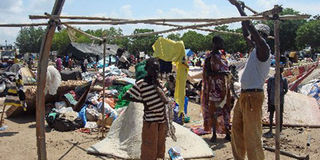More UN troops might not quell violence in South Sudan, inquiry suggests

This handout photo provided by the United Nations Mission in the Republic of South Sudan and released on July 16, 2016 shows a child posing as a man sets up a shelter at the United Nations compound in the Tomping area in Juba. PHOTO | BEATRICE MATEGWA | AFP
What you need to know:
Soldiers and police guarding a civilian-protection site in Malakal did not prevent the deaths of at least 30 South Sudanese.
- As a result of this violation of standing orders, two commanders of the Malakal peacekeeping detachment have been relieved of their duties and returned to their home countries, a UN spokesman said.
A new proposal to add 4,000 troops to the United Nation's (UN's) peacekeeping force in South Sudan might not achieve its intended effect of quelling violence, an inquiry on the past performance of UN units suggests.
A contingent of Rwandan, Ethiopian and Indian peacekeepers failed “at all levels” to protect civilians from attacks last February likely carried out by South Sudan’s army, the UN said at the weekend.
Soldiers and police guarding a civilian-protection site in Malakal did not prevent the deaths of at least 30 South Sudanese due to “a combination of inaction, abandonment of post and refusal to engage,” a special UN board of inquiry stated in a published summary of its report.
As a result of this violation of standing orders, two commanders of the Malakal peacekeeping detachment have been relieved of their duties and returned to their home countries, a UN spokesman told the Nation on Sunday. The spokesman did not reveal the nationality of the ousted commanders. And while no individual peacekeepers appear to have been punished for their disobedience, the UN spokesman said “additional actions are being considered” in response to the Malakal inquiry.
The finding that UN soldiers and police ran away or refused to fight when civilians were attacked casts doubts on the potential effectiveness of a US effort to win Security Council approval for expanding the South Sudan peacekeeping deployment. The council is scheduled later this week to debate the US proposal for a 30 per cent increase in the 13,500 uniformed personnel who currently make up the UN Mission in South Sudan (Unmiss).
Delays in bolstering Unmiss are possible even if veto-empowered China and Russia, long sceptical of US policy on South Sudan, acquiesce to Washington’s latest initiative. It took a year for troop-contributing countries to respond fully to Security Council authorisation of a surge in Unmiss strength following the outbreak of civil war in South Sudan in December, 2013.
As the Malakal inquiry suggests, peace in South Sudan hinges on Unmiss’ ability to counter tribal violence and aggressive actions by South Sudan’s army.





